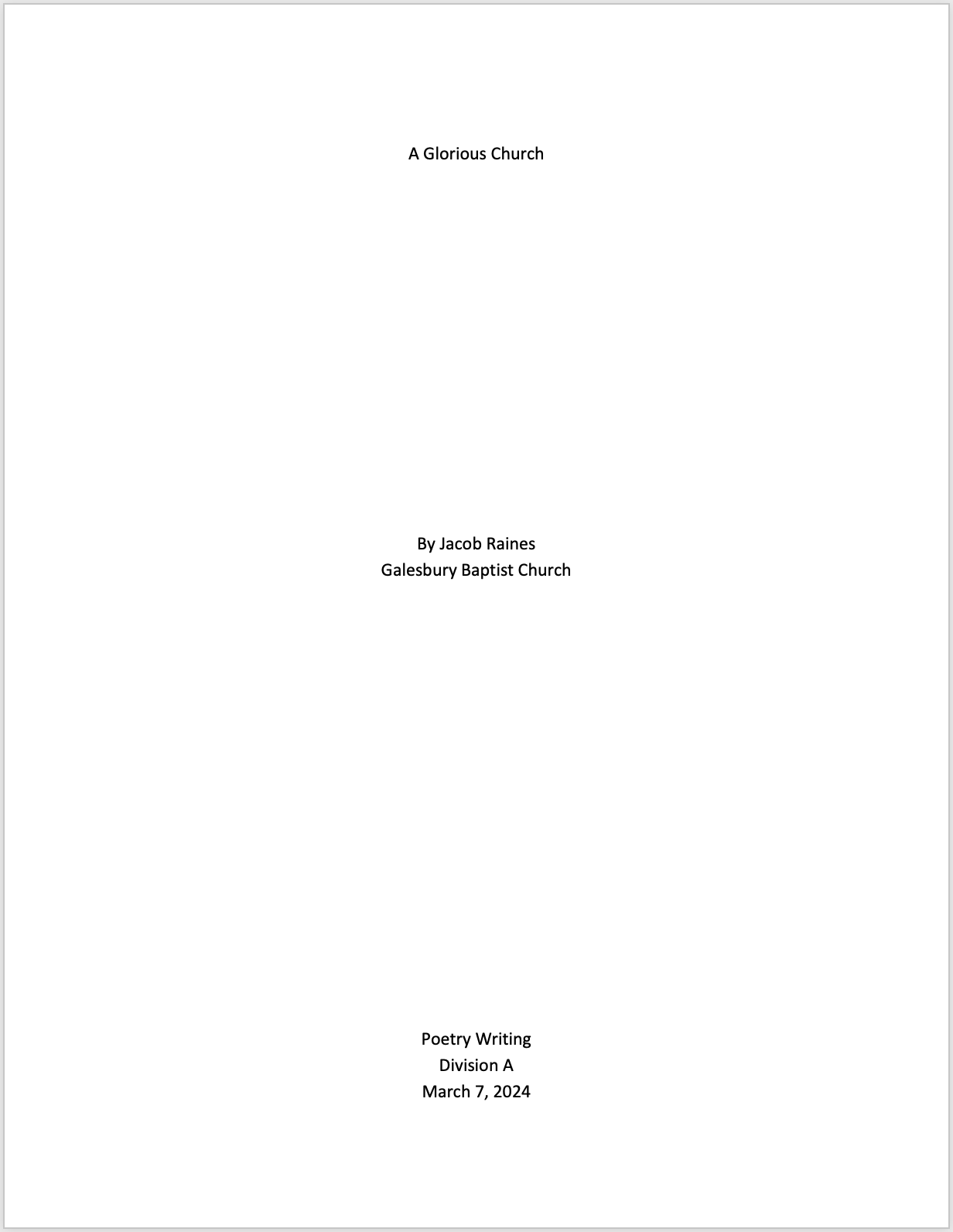Poetry Writing Guidelines
Each school is allowed to enter 3 students, male or female, per Division.
Each student may only submit 1 poem.
Poems must be submitted two (2) weeks before Convention or your entry will not be judged.
Please send a clean scan of the poem, the Poetry Writing Judging Form (filled out with student information) as well as the signed Statement of Assistance to dlindhorst@faithway.org.
The participant writes an original poetry composition with a Christian, patriotic, Biblical, evangelistic, persuasive, or historical theme. The participant should keep in mind his purpose for the poem – why it is being written and what effect is being achieved.
The poem may be narrative or discursive with an assumed or personal point of view. All poems are lyrical, though usually not written to be sung. You may, however, specifically choose to craft your poem as lyrics to be set to music. Each poem is to have rhyme and meter. No free verse will be allowed.
The poem must have been written after the end of the previous year’s Student Convention and must be the original work of the student.
Plagiarism of any kind will automatically disqualify the entry. Poems using AI will not be judged.
A significant portion of the poem must be written during school hours to verify authenticity. A statement declaring how much assistance was provided must be submitted with the poem.
Checklist of Poetry Writing:
Format – at least eight (8) typewritten (double-spaced) and not more than thirty (30) typewritten lines on plain white paper. Variations from these line limitations must show evidence of very careful attention to work choice and structure, plus strong thematic basis.
The entry must be typed in 12 point font. Use an easy-to-read font such as Times New Roman, Calibri, etc. The entry must be double-spaced.
Please be sure to follow instructions given for the cover sheet as shown with for all poem entries.
Hints from Poetry Writing Judges:
Judges look for poems that are neat in appearance, complete in thought, and effective in message and impact. The true purpose of a poem is to transmit in words a complete thought and, at the same time, to move emotions. A poem must have a reason for existence; the emotional impact and a resultant change in attitude is that reason. If your poem is correct in form, yet is not logically correct or emotionally stimulating, the poem will not score well.
A poem must DO something, not merely talk about something. The theme, then, becomes of utmost importance; for, if the poem is to do something, it must do something worthwhile. Second, but still important, is the form of the work. If the form is weak or inconsistent, it will not fall correctly on the ear, causing the message to be lost to the reader.
Poems should have a lyrically quality, though they may not be intended for music. Remember, a poem can only do ONE thing, not several. Strive for unity of purpose and skill of execution. Technical errors of any sort, especially those that might be thought of as minor, such as a misplaced comma or misspelled word, often represent major weaknesses in aspects that are less obvious to the trained eye and ear. A scrupulous writer always attends carefully to the smallest and most obvious detail.
What is said is always at the mercy of how it is said. When this principle is ignored, the reader will not be guided by the writer’s thoughts but by his own. These thoughts may be counterproductive to the writer’s subject and intention and become an unconscious use of stock responses, formulaic phrases, hackneyed expressions, irrelevant associations, and sentimentality rather than honesty. A poem that effectively treats a subject moves the reader to a place where he has never been before.
POETRY WRITING JUDGING CRITERIA (Download PDF)
| Areas of Evaluation | Possible Points |
|---|---|
| Theme | |
| Evangelistic, inspirational, Biblical, Christian growth, patriotic, persuasive, or historical theme. Poem has one central idea; unity in viewpoint. | |
| A. Unity and coherence | (1-10) |
| B. Clarity | (1-10) |
| Use of poetic material | |
| A. Sentiment and emotion – sincerity | (1-10) |
| B. Vocabulary – exact, colourful, and concrete | (1-10) |
| C. Meter – established and effective | (1-10) |
| D. Sounds – rhyme, assonance, consonance, alliteration, etc. | (1-10) |
| E. Poetic devices – figures of speech, symbolism, and patterns | (1-10) |
| F. Creativity | (1-5) |
| Mechanics | |
| A. Format and general appearance | (1-5) |
| B. Usage, punctuation, and spelling | (1-15) |
| Proper documentation submitted | (1-5) |
| TOTAL POINTS | (100) |
Note: as many as 10 points may be subtracted if poem is not 8 to 30 lines in length and is not printed / typed on plain white paper.
Sample of cover sheet for Poetry:
Download cover-sheet-sample.docx file

